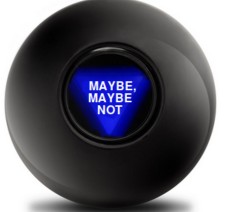 our facts everyone needs to know about science:
our facts everyone needs to know about science:
• All discoveries are presumed wrong until they've been
repeatedly replicated.
• Anyone who says all science is wrong is almost
certainly himself wrong.
• Everything you read is either a theory, a falsehood,
or an oversimplification.
• Everything in science is an advertisement.
The scientific method is a way of getting honest answers from dishonest people. People want to believe everything that passed peer review is correct. When they discover it's not, they're forced to make a terrible choice: either reject the claim and assume the opposite is true, pretend it's true to avoid conflict, or learn the science.
Psychologists tell us that resistance to premature closure and tolerance of uncertainty are the hallmarks of scientific reasoning. We have another name for them: skepticism.
Skepticism is in danger. Many attribute this to politicization, where thinking a dissident thought automatically makes you an enemy. People don't want to be forced to slog through a dozen textbooks to learn the details, assuming that the textbooks are correct (which they often are not) so they abandon nuance and glom onto extremes. So half the population says masks protect and the other half say they're useless. Half say the ozone hole is worse than ever; half say it no longer exists. Half say eggs are deadly; half say eggs are the perfect food. And they're all sure that anyone who disagrees is lying.
You might think that the law of excluded middle, which says that either a statement or its negation must be true, would hold; however, in the real world people change the meanings of the words: ‘masks work’ is not necessarily the opposite of ‘masks don't work’ because ‘work’ has unknowingly been defined differently.
Free will
Remember when physicists all told us the brain was a quantum computer? The brain, it was thought, decides things randomly, just as a radioactive particle disintegrates at a random and unpredictable time. The universe is a wave function, and only becomes a real, physical object when it's observed. Humans have free will because the brain is a perfect random number generator.

Magic eight-ball
One might think from watching our politicians make decisions that they are walking random number generators, but it was obvious to most biologists that being able to make choices is not the same as being random. In fact, they are opposites. It was an example of how even great scientists get things dreadfully wrong when they convince themselves that now, suddenly, their greatest theory explains all the world's mysteries.
The success of neuroscience, as impressive as it may be, doesn't mean we do or do not have free will. It means the question is ill-posed. If you don't have a non-circular definition of either “free” or “will,” you'll get nowhere if you ask whether we have it.
Global warming
The theory of global warming is that carbon dioxide prevents escape of infrared radiation from the surface. Anyone looking at the radiative transfer equations can calculate in a few minutes that IR absorption by CO2 in an atmospheric column is fully saturated, which means the heat balance of the planet is unchanged. The most that can happen is that air warmed indirectly by solar radiation might remain at a slightly lower altitude than before.
The news media tell us that computer models “prove” that blocking the Sun will save us from this supposed crisis, which the writers of other computer models say their model “proves” will definitely possibly potentially maybe happen. It's a case of dueling computers. Maybe all we really need is a really big fan. Let's put the Only Fans people to work and cure global warming forever.
Artificial Intelligence
Our so-called "AI" is now creating cartoon pictures of George Washington as a black person and the Pope as a South Asian woman. It's no longer credible to pretend that AI actually “knows” anything, let alone that it “invented a new language” when the AI program, like that Odysseus lunar lander that mysteriously turned out to be a just tad top-heavy, suddenly tips over with a clunk and starts spewing garbage onto the Internet.
All that's happened is that the term “AI” has been re-defined to mean “whatever our computers are doing at the moment,” but our politicians are supposedly considering 407 different bills to regulate it. It's pointless to tell them there is no such thing: there are only computer programs. The concern with “deepfakes” may or may not be sincere, but people have faked how they look for thousands of years. A computer does it and suddenly it's a crime, and it will radically change how we can use computers.
What do all these snafus have in common? People are pretending to know things instead of actually understanding them. They go ballistic if you tell them the Big Bang and cosmic inflation and are still just theories, or the ozone hole might not be caused by CFCs after all, or that science has no clue what consciousness is, or that Big Pharma is nowhere near curing Alzheimer's, or that ignoring the old people who know how things bounce on the Moon is a bad idea, or there is no such thing as symptomless Covid, or that a computer model cannot, even in principle, give us new knowledge. But people want these things to be true, so they believe them.
The world is far more complicated than we know. We need real, skeptical scientists—and there are still some out there—to keep making this point. And we need the funding agencies, bureaucrats, and publishers to let them.
feb 26 2024, 6:32 am. updated feb 27 2024, 5:20 am
